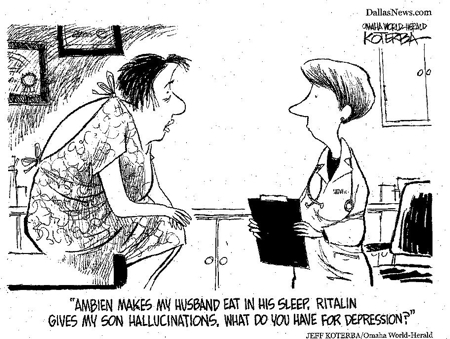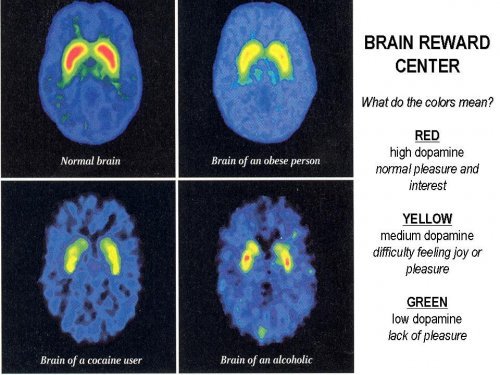Give me something to fix my problem. Don’t give me anything that could ever cause any side-effects …
Fortunately most people are fair and reasonable. They know anything strong enough to significantly change brain functioning, put you to sleep, stop panic attacks or anxiety, relieve depression, or improve focus and motivation has to be strong enough to sometimes cause side-effects. The infinite variety of genetics that helps make each of us unique can cause a myriad of idiosyncratic reactions to medication.

Case in point. “Perchance To … Eat? A few Ambien users find themselves at the fridge” was an article in Newsweek, March 27, 2006. The story is about a woman who was sleepwalking and bingeing during the night. She found out online that other people taking Ambien were having this problem. A New York attorney has filed a class action suit on behalf of 300 patients who complain of similar problems or of doing things while sleepwalking that are dangerous, like driving a car. Most or all of these people apparently have a history of sleepwalking.
Sleepwalking occurs during deep, stage 4 sleep. Ambien (and other sleep medications Lunesta, Sonata) help restore normal sleep, which includes deep sleep. Twenty-six million prescriptions were written in the U.S. last year for Ambien. Since this case was reported 2-3 weeks ago, prescriptions have been falling off.
In our litigious society, there is a history of overreaction where the benefits of the many are lost because of the misfortune or idiocy of the few (or sometimes the one).
For any given medication, there are literally hundreds of possible side-effects, including those that are rare (defined as less than 1 per 1,000). The massive amount of information makes it difficult to find the important, relevant information.
Common side-effects are usually due to
- over-shooting the blood level in search of the “right dose”
- common genetic variants
- combining different medications
- or many other possibilities
In making a joint decision to try a medication, a doctor and patient consider potential benefit vs. potential risk. It’s not fair or reasonable to say after a rare side-effect “this medication shouldn’t have been prescribed.”
If we use the principle, “don’t prescribe any medication that can ever cause a potentially serious side-effect,” we might as well close the pharmacies. Anaphylactic reactions to penicillin are a case in point. While we’re at it, let’s also get rid of shell fish, peanuts, and strawberries.
There has to be a reasonable balance. On the one hand, the Hippocratic Oath is, “first do no harm.” On the other hand, surgeons are told if you never remove a normal appendix you are being too careful – dangerously cautious. Waiting until an appendix ruptures while waiting to be certain will jeopardize a life. The best mantra is, “benefit vs. risk.”


One thought on “You Can’t Have It Both Ways”
Hi Dr. Jones,
I recently had a thyroid test to find out if I needed to be on medicine for my thyroid.
My TSH function was abnormal 0.286 which is unusually low
My T4 – 8.7 T uptake was 32.0 and T-7 was 2.8. My doctor just explained to me I was in a gray area. I don’t think that was a good explanation for a doctor. what do you think?